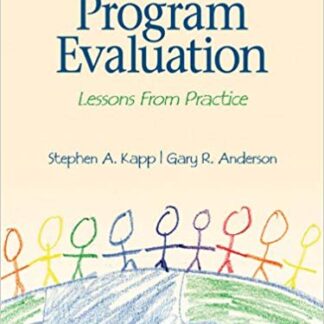Description
Evaluation: A Systematic Approach 8th Edition by Peter H. Rossi, ISBN-13: 978-1506307886
[PDF eBook eTextbook] – Available Instantly
- Publisher: SAGE Publications, Inc; 8th edition (January 11, 2019)
- Language: English
- ISBN-10: 1506307884
- ISBN-13: 978-1506307886
Evaluation: A Systematic Approach, by Peter H. Rossi, Mark W. Lipsey, and Gary T. Henry, is the best-selling comprehensive introduction to the field of program evaluation, covering the range of evaluation research activities used in appraising the design, implementation, effectiveness, and efficiency of social programs. Evaluation domains are presented in a coherent framework that not only explores each, but recognizes their interrelationships, their role in improving social programs and the outcomes they are designed to affect, and their embeddedness in social and political context.
Relied on as the “gold standard” by professors, students, and practitioners for 40 years, the new Eighth Edition includes a new practical chapter on planning an evaluation, entirely new examples throughout, and a major re-organization of the book’s content to better serve the needs of program evaluation courses
Table of Contents:
Preface
Acknowledgments
About the Authors
1 | What Is Program Evaluation and Why Is It Needed?
What Is Program Evaluation?
Why Is Program Evaluation Needed?
Systematic Program Evaluation
The Central Role of Evaluation Questions
The Five Domains of Evaluation Questions and Methods
Summary
Key Concepts
2 | Social Problems and Assessing the Need for a Program
The Role of Evaluators in Diagnosing Social Conditions and Service Needs
Defining the Problem to Be Addressed
Specifying the Extent of the Problem: When, Where, and How Big?
Defining and Identifying the Target Populations of Interventions
Describing Target Populations
Describing the Nature of Service Needs
Summary
Key Concepts
3 | Assessing Program Theory and Design
Evaluability Assessment
Describing Program Theory
Eliciting Program Theory
Assessing Program Theory
Possible Outcomes of Program Theory Assessment
Summary
Key Concepts
4 | Assessing Program Process and Implementation
What Is Program Process Evaluation and Monitoring?
Perspectives on Program Process Monitoring
Assessing Service Utilization
Assessing Organizational Functions
Summary
Key Concepts
5 | Measuring and Monitoring Program Outcomes
Program Outcomes
Identifying Relevant Outcomes
Measuring Program Outcomes
Monitoring Program Outcomes
Summary
Key Concepts
6 | Impact Evaluation: Isolating the Effects of Social Programs in the Real World
The Nature and Importance of Impact Evaluation
When Is an Impact Evaluation Appropriate?
What Would Have Happened Without the Program?
The Logic of Impact Evaluation: The Potential Outcomes Framework
The Fundamental Problem of Causal Inference: Unavoidable Missing Data
Summary
Key Concepts
7 | Impact Evaluation: Comparison Group Designs
Bias in Estimation of Program Effects
Potential Advantages of Comparison Group Designs
Comparison Group Designs for Impact Evaluation
Cautions About Quasi-Experiments for Impact Evaluation
Summary
Key Concepts
8 | Impact Evaluation: Designs With Strict Controls on Program Access
Controlling Selection Bias by Controlling Access to the Program
Key Concepts in Impact Evaluation
When Is Random Assignment Ethical and Practical?
Application of the Regression Discontinuity Design
Choosing an Impact Evaluation Design
Summary
Key Concepts
9 | Detecting, Interpreting, and Exploring Program Effects
The Magnitude of a Program Effect
Detecting Program Effects
Examining Variation in Program Effects
The Role of Meta-Analysis
Summary
Key Concepts
10 | Assessing the Economic Efficiency of Programs
Key Concepts in Efficiency Analysis
Conducting Cost-Benefit Analyses
Conducting Cost-Effectiveness Analyses
Summary
Key Concepts
11 | Planning an Evaluation
Evaluation Purpose and Scope
Data Collection, Acquisition, and Management
Data Analysis Plan
Communication Plan
Project Management Plan
Summary
Key Concepts
12 | The Social and Political Context of Evaluation
The Social Ecology of Evaluations
The Profession of Evaluation
Evaluation Standards, Guidelines, and Ethics
Utilization of Evaluation Results
Epilogue: The Future of Evaluation
Summary
Key Concepts
Glossary
References
Author Index
Subject Index
What makes us different?
• Instant Download
• Always Competitive Pricing
• 100% Privacy
• FREE Sample Available
• 24-7 LIVE Customer Support




